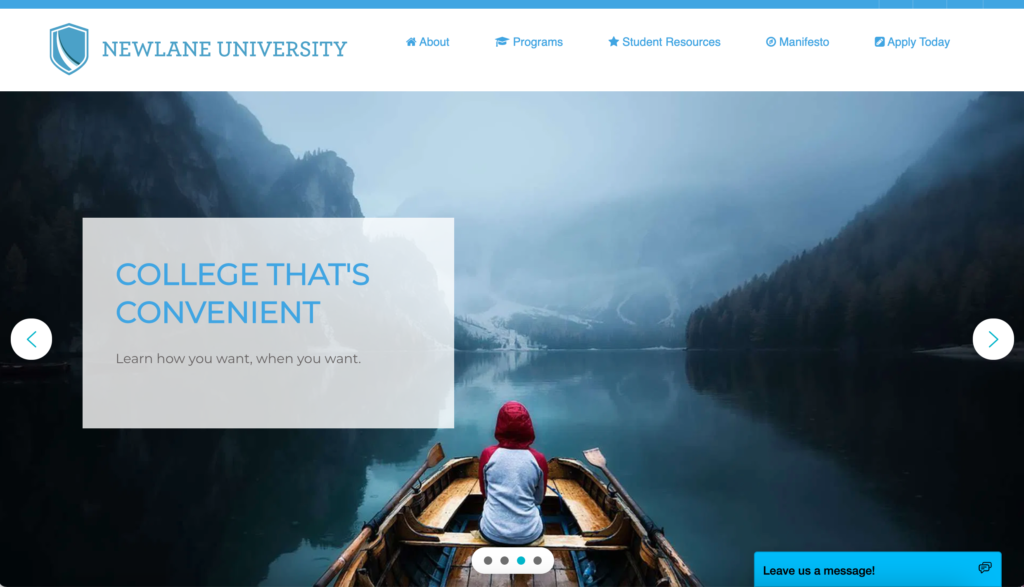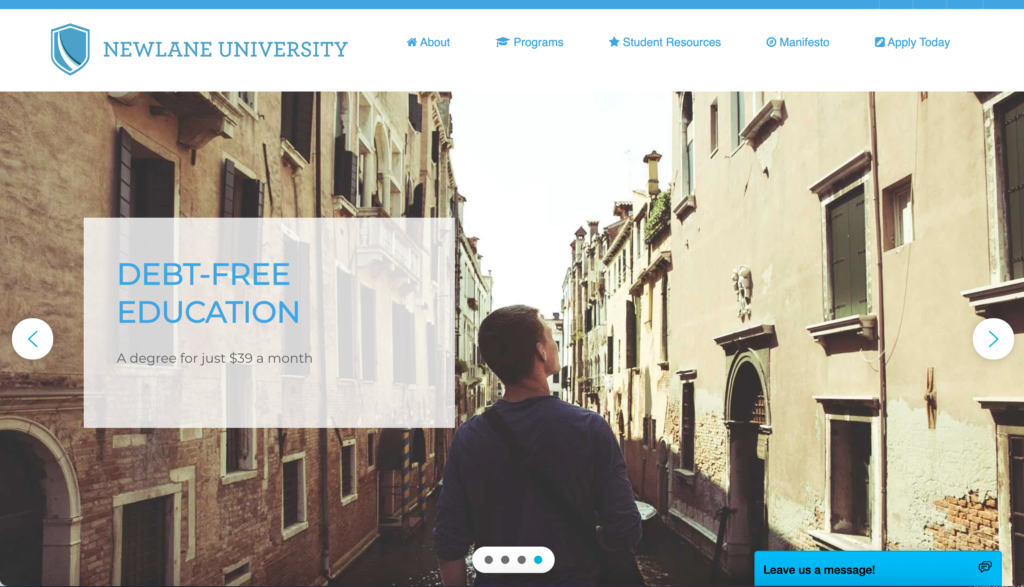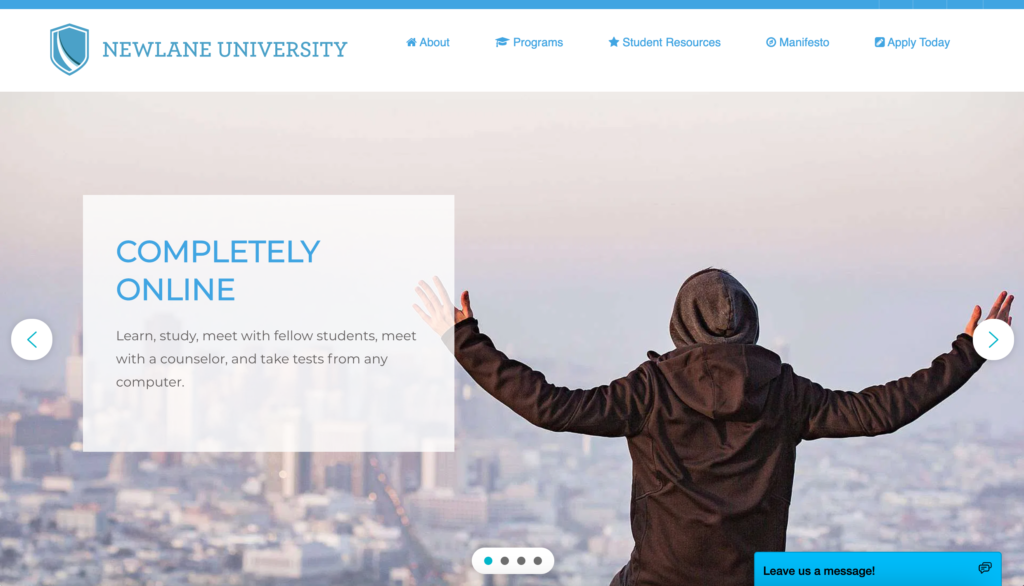
Several years ago Ben Blair launched a startup company: an affordable online university called Newlane. He started the university with his education-tech-philosophy-collaborator (and my brother), Josh Stanley. I talked about the startup back in 2016 when they launched with a kickstarter — when it was still mostly an idea and not a full-fledged university. But I’ve been mostly quiet about it ever since, while they worked on accreditation. But the big news (the very good news!) is that International Accreditation with ASIC has been achieved!!!
The accreditation process is intense. So much more intense than I would have ever guessed. The process is ongoing over multiple years and requires a huge investment of dedication, time, and money. So we are celebrating big time over here! Founding and building a university from scratch, and earning ASIC accreditation, is incredible. I know the sacrifices they’ve made to reach that goal, and I’m super proud of them for what they’ve accomplished.
To celebrate the good news, I thought it would be fun to interview Ben about Newlane. I get asked all the time about what he does for work, and when I answer, people are genuinely curious to know more, and they have lots of great questions. I thought this would be a cool way to cover the most frequently asked questions, and give a good overview about the university.
Q. For those who don’t know you, give us a little bit about your background and how it led to starting a university.
A. My background is in philosophy and education. I did a Philosophy BA at BYU for undergrad, then, when we moved to New York, I did two Masters degrees and a PhD in Philosophy & Education at Columbia University.
I am very conscious about the rising costs of college — especially so as a father of six. When Josh (who has 5 kids) approached me with the idea of creating a university that offered a 4-year accredited degree at the lowest cost possible, I was on board immediately.
The school is still very small, so everyone on our team wears multiple hats and takes on multiple roles, but my main role is Director of Education for the university.

Q. Give us a short overview of what Newlane University offers.
A. Newlane University makes earning a 4-year, U.S. degree accessible to students of all budgets, living anywhere in the world. If you have a reliable internet connection, you can make this happen.
Newlane was created from an abundance mindset. It’s common knowledge that everything you need to learn to be a rocket scientist is available online, for free. Which means a degree should be very affordable! Newlane set out to organize those free learning resources into degrees, and give students a reliable way to confirm and demonstrate what they’ve learned, making a degree available at the lowest cost possible.
Q. How much does it cost?
A. The quick answer: $ 1500 per degree.
The longer answer: Our pricing is very different than any other university in existence. You pay a one-time enrollment fee of $ 249, that gives you access to all the courses, learning materials, the experts, the assessments, the library subscription, etc.. Then you pay $ 40/month. Once you’ve reached $ 1500 in monthly payments, the monthly charges will stop — even if you’re still working on your degree. You can continue working on your degree with no further monthly charges.
You can pause or stop the $ 40/month and take a leave of absence if needed. Maybe you had a death in the family and won’t be in the mindset to work on school for a few months. No problem.
I’ll explain how it works:
-If you are starting from scratch, you’ll begin with an Associates Degree, which costs $ 1500.
-If you want to continue and earn a Bachelor’s degree, that costs another $ 1500 — or $ 3000 total for a 4-year degree.
-If you already have an Associates Degree, then you can transfer that degree to Newlane, and you just need to earn the Bachelors Degree, which would cost $ 1500 total.
-If you already have a Bachelors Degree, and want to earn another one with Newlane, the cost of that second Bachelors Degree would be $ 1500 total.
-If someday we offer a Masters Degree, the price will be $ 1500.
-In summary: the price is $ 1500 per degree.
-In each of these cases, you’re charged $ 40 per month, and not a flat fee of $ 1500. Once you hit $ 1500, the monthly payments stop, but you can continue to be enrolled, and continue working on your degree. (You can find more info about our pricing on the Newlane Tuition and Fees page.)
Q. What’s the next closest affordable degree that you have found?
A. The next most affordable degree is around $ 5000.
Q. What about transfer credit? What if a student took a bunch of college courses, but never finished their degree?
A. We love giving transfer credits. Students can submit their transcript from any accredited college (or AP courses!), and Newlane will typically accept any courses with a passing grade (C or above).
Transfer credit is a great way to speed up the time it takes to earn a degree. If you started college, but didn’t finish, Newlane may be the perfect fit for you.
Q. Is Newlane University accredited?
A. Yes! We started by tackling International Accreditation, because we have students in countries all over the world. We are accredited internationally by ASIC, a well-established accrediting agency based in the UK. You can read about them here.
We are still in the process of applying for U.S.-specific accreditation. Accreditation in the U.S. is a bit different because it’s tied to student-loans (student-loans aren’t really a thing in many countries). Only schools recognized by the U.S. Department of Education (USDOE) can offer government-backed loans to their students, and the USDOE only recognizes certain U.S.-based accrediting agencies.
At Newlane, our degree price is so affordable that we don’t offer any student loans (and we never want our students to go into debt for their degree!). That said, we want students to be as confident as possible about our college, so we are pursuing accreditation that is recognized by the USDOE.
Q. You mentioned students from around the world. How many students are enrolled? And from which countries?
A. We have students in Argentina, Canada, Mexico, Thailand, Vietnam, Italy, Zambia, UK, and more. It’s so great! But keep in mind, our school is still very young and small. So our total enrollment at the moment is about 40 students.
We don’t mean to keep the enrollment small. We intentionally haven’t done any marketing until we achieved the ASIC accreditation. In fact, the students who have found us and enrolled, have mostly come through random searches for “affordable online degrees”. We’re looking forward to getting the word out about Newlane and enrolling more students who could benefit from our services.
Q. Has anyone graduated from Newlane University yet?
A. Yes! We had our first official graduate this past Spring. And we’re proud to say she has gone on to enroll in a prestigious graduate program studying at the University of Nottingham.
It was really, really cool creating a diploma for our first graduate. Also cool: at the moment, we have a handful of other students who are nearing graduation.

Q. What degrees do you currently offer?
A. We offer an Associates Degree in General Studies, and we offer a Bachelors Degree in Philosophy.
We have intentionally kept our degree offerings to the bare minimum as we go through the accreditation process. But as we finish that up, we plan to add new degrees and we’re very excited about that.
Q. When do you expect to add new degrees?
A. We have projected adding Business, Computer Science, Graphic Design, and Education degrees by the end of 2022.
That means, if Philosophy doesn’t interest you as a degree, you could enroll at Newlane today, do all of your General Studies courses, and by the time you’re ready for your major courses, the new degrees could be ready to go! Alternatively, you could do your General Studies courses with Newlane, and then transfer to another university for your major — which would essentially cut the time and cost of your degree at that university in half.
Q. Why did you launch with a Philosophy Degree?
A. A few reasons: 1) We wanted to make it clear from the beginning that we are a serious-minded institution of higher learning, and not a diploma-mill or just a job-training certificate. Philosophy is one of the oldest degrees and signifies a true interest in learning.
2) A Philosophy Degree gives you skills in critical thinking, being able to read well, write well, and express yourself clearly, how to construct and critique arguments — skills that are valuable no matter what you decide to do after you earn your degree.
3) A Philosophy Degree is one of the best preparations for graduate programs, including law school.
4) I was charged with building the first degree, and Philosophy is my personal area of expertise.
Q. What are your students like? What’s their profile?
A. That’s a fun question. Here are 3 example profiles of students at Newlane:
Student X — She wants to teach English in China, but government regulations mandate that she needs a degree; it doesn’t really matter what the degree topic is, the opportunity just requires a bachelors degree.
Student Y — He took some college courses but didn’t get a chance to finish his degree, and always wanted to.
Student Z — They have a degree in computer science, but have always been interested in philosophy. It didn’t make sense to go back to a traditional university to pursue a hobby, but Newlane is affordable enough to make getting another degree realistic.
Q. What kind of students are you looking for?
A. While students currently enrolled at traditional universities are welcome to transfer to Newlane, you might be surprised to hear they are not actually who we had in mind when we built this school.
When you look at a piechart of all students enrolled in colleges and universities in the U.S., it is quite shocking. All the universities you’ve heard of? The ivy-leagues, the state schools? They only account for ~30% of students enrolled. The rest of the students in the pie chart attend colleges that most of us have never heard of us — you see them off the side of the freeway in nondescript buildings. And a good portion of those are scams. The scammy programs tend to tie their tuition costs to the maximum allowable student loan levels, and pile their students up with tuition-based debt.
We would love to see those students come to Newlane instead, where they will never need to go into debt for a degree.
But Newlane is not just for U.S. students! As I mentioned, we have students from all over the world. In many places, a U.S. degree is considered very valuable, but is typically out of reach for all but the most wealthy. Just getting a student visa to come to the U.S. is a daunting and expensive project. And international students often have to pay the inflated U.S. tuition rates, plus total housing costs, up front, without access to student loan programs. So it’s just not feasible for most people in the world.
But with Newlane, anyone with a reliable internet connection — no matter where in the world they are based — can now access a U.S. college degree.
Q. What is it like taking classes at Newlane?
A. This might be my favorite question, because we’ve built this from scratch. All classes on Newlane are made from course objectives. Course objectives are a list of specific things a student needs to learn in order to pass a class.
For example, in a Biology 101 class, one of the course objectives could be: Explain the process of photosynthesis.
So a student enrolls in a class, and they’ll see the list of objectives. If they click on an objective, there will be resources and links that our professors have vetted, where they can learn that objective. The resources can be anything — youtube videos, TED talks, journal articles, interactive games, textbooks, etc.. The student can use any of the listed resources, or even come up with their own — like maybe their Aunt is a biology teacher, so they call her up and ask her to teach them about photosynthesis. Students can learn the objective however they see fit.
Once they’ve mastered all the objectives for the course they are enrolled in, they can pass off that course.
Q. What is it like passing classes at Newlane?
A. Another of my favorite topics! There are 3 phases to passing a course at Newlane. The first phase is self-determined. Once you learn an objective, you mark it off. Simple as that. It will be as meaningful as you make it.
The second phase is a computer-scored test. The student will answer questions about every single course objective and the computer will automatically score the test and let the student know if there are objectives they need to review. And yes, if students want to cheat here, they can, but it’s not really going to help them, because of phase 3.
The third phase of passing a course is a live video review with a course professor. When the student is ready and feels they’ve learned all the objectives for a course, they set up a live video chat with a course professor. Our professors and subject experts are located all over the world, so you can easily find someone that works with your time zone.
On the video call, the professor will confirm the students I.D., and then ask the student questions. The questions can be about any of the course objectives. They can be open ended. There can be follow up questions. The student really needs to know those objectives. At the end of the call, the professor will determine one of two things: 1) the student passed the course, or 2) there are objectives the student needs to review.
If the student needs to review objectives, they can do so using whatever resources they prefer, and then set up a new video call. This is so cool! It means students don’t have to re-enroll in the class in a future semester! You don’t get a failing grade.
Q. You mentioned professors all over the world. Tell us more about your professors and subject experts.
A. Yes, it’s true. Our English-speaking experts are based in Hungary, Belgium, Argentina, China, Canada, India, the U.S., etc.. They are well qualified, thoroughly trained, and tend to use Newlane as a sidegig. (As Newlane grows and enrolls more students, we expect full-time positions will open as well.)
One of the nice things for our professors is that they can choose the parts of the job they like best. They can do video calls so students can pass off courses, they can grade papers, they can build new courses and new degrees, they can create learning resources for course objectives (like mini video lectures). But they don’t have to do all of those; they can just choose the tasks they prefer.
Q. What’s the quality of the degree like?
A. I would say: don’t be fooled by the price! The low-cost might make you think this is a really easy degree or something you don’t need to take seriously. But that’s not true at all. When building our degrees, we compare and align them with the top universities in the country, so our courses are rigorous, and expect serious learning from the student.
Q. Do students get a transcript?
A. Yes. And it’s an especially good one. A traditional transcript doesn’t tell you much. It might say Biology 101— B+. But that doesn’t tell you what was actually covered in the course, and which things you learned well (or didn’t learn well — because maybe you missed a couple of classes).
A Newlane University transcript is different. It lists the objectives for each course, so anyone can see exactly what was covered in that class. And since students need to master all course objectives before passing a class at Newlane, the transcript shows exactly what a student mastered as well, (not just what was covered in the class).
Q. Tell me more about students having to master every objective in the course. It’s like they all have to get an A?
A. It’s called Competency Based learning — students get credit for demonstrating mastery, not just doing assignments or spending time in class. A student doesn’t pass the class until they’ve mastered every objective for that class.
One of the reasons we wanted to start Newlane is because this is a better model of education. The lower cost of our degree is a symptom of a better model, in an environment where we have better access to abundant quality instructional resources.
We’re not the first school to adopt Competency Based Education, but we do think we’re the logical end to that movement.
Q. How long does it take to earn a degree with Newlane?
A. Newlane classes are designed to take the same amount of hours a traditional college course would require. So a two year degree would take two years. That said, Newlane is totally self directed and competency-based, so if you want to move through courses quickly, you can! And if you want to take your sweet time, that’s fine too!
If a student already knows a lot of the coursework from earlier studies, in theory, they can pass classes more quickly and earn a degree more quickly.
Q. How do I sign up?
A. We enroll students every day, all year long. There is no official start to the semester. In fact, there is no semester! You can start whenever you want to. Even today. Go to our Apply Today page to get started or learn more.
Q. Are your own kids enrolled in Newlane?
A. They are not at the moment. Ralph and Maude are both attending California state schools. And Olive is attending film school in Paris. Of all our kids, I think Oscar may be the most likely to do a Newlane degree — but I think he would probably do it concurrently with a traditional university, and then earn two separate degrees. Oscar is very self-directed in his learning, and enjoys watching Kahn Academy classes just for fun.
I hope this answer makes clear that we don’t pretend to think Newlane is the perfect fit for everyone. Many people benefit by attending traditional universities — including our own kids. But for people where schedule, budget, or geography make enrolling in a traditional university impossible, Newlane is a really terrific alternative, and the most affordable alternative out there.
Q. Can I offer a scholarship for a student in need?
A. What an awesome question. That is something I love about Newlane. At a traditional unversity, you’d have to be pretty wealthy to set up a scholarship endowment (think: $ 100,000 range). But with Newlane, anyone who can afford $ 40 per month, could put someone through college! How cool is that?
We are continuing to develop our scholarship options, and we have some great programs already in place. Email me to discuss if you’re interested in setting up a scholarship.
Q. For anyone who has been following along since the launch, they may remember the school was originally called Teachur.co, and now it’s called Newlane University. Why the name change?
A. As the school has grown from an idea to an actual degree-granting institution, we chose Newlane because we appreciate that it sounds like it could be a university you might find in New England — one of the big centers for education in the U.S., but we also like what the name means: this is a New Path for education.
Q. Anything else people should know? Anything you are excited about that we haven’t covered?
A. Our schools is still young, so we’re listening carefully to students. Our current students are helping us decide what degrees we should offer next and which new features we should implement, or that they find the most valuable. So if you want to influence the direction of Newlane, consider signing up!
Lastly, we are officially trying to get the word out about Newlane. If you have any interest in talking — about student loan debt, about online learning, about Competency Based Education, about this new concept for a university, about rising tuition prices, about educational technology, about educational philosophy — in your podcast or website or newsletter, we would be delighted to answer questions or tell you more. Feel free to reach out.
—–
Did you make it all the way to the end? Hah! That was a long interview — I’m super proud of Ben and didn’t want him to leave out any of the awesome details.
What’s your take on the idea of Competency Based Education? Would you appreciate a detailed transcript like Ben described? How would you feel about getting a 4-year degree entirely online and never visiting a college campus? Do you think of yourself as a self-directed learner? Or do you prefer due-dates and deadlines to help you move things along? I’d love to hear.



